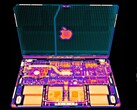Speculation that Apple is developing an electric car has been doing the rounds for a number of years: First rumoured in 2008, but picking up speed in 2015. Even though (at this point) Apple is not "officially" an electric vehicle (EV) manufacturer, Apple and the EV industry actually share a lot in common, both in the way they manage their hardware and the software that drives their products.
Repairability
Despite what Apple might lead you to believe with its “Self Repair Service”, Apple does not want you to repair its products. Even with its publicised focus on repairability, that shiny new M3 MacBook Pro scored a woeful 4 out of 10 for repairability according to iFixit. Similarly, Apple does not want 3rd party repair centres to repair its products either. Apple may lead you to believe you can repair its products and will even provide you with specialist tools and parts, for a hefty deposit and a fee.
But the process of actually doing so is created to be so laborious, impractical and expensive that the large proportion of people are better off handing it in to an Authorised Repair Center to get the work done. If self repair is your thing you might be better off with a Pixel 8 which is currently seeing a massive saving for Black Friday (available on Amazon*).
Car manufacturers definitely do not want you tinkering with your EV. While your iPhone 15 pro Max is unlikely to kill you, the amps in an EV battery probably will. The consequences of a self repair on an EV could very well mean death, if not from the repair itself but the crash that follows due to a poor job. The self serviceable parts you can buy from Tesla are limited to wheels, 12 volt batteries, chargers and cabin filters.
Even if you take your car to a 3rd party repair centre, they may be unable or unwilling to work on your vehicle. With tooling starting at around US$30,000 and a requirement for specialist training many 3rd party garages simply won’t make the investment. Therefore your only option, and an expensive one at that (particularly if you want to retain your warranty) is to return it to an Authorised Repair Center.
Software updates
Both EV manufacturers and Apple keep your devices secure with Software updates, a fairly essential practice in 2023. However this gives manufacturers complete control over what you can and can’t do with your product at any point in its lifespan. While adding and removing features from software in the computing industry has been common practice for years, users can find it frustrating to find features they used to rely on missing after a software update. In 2017 Apple pushed a software update that intentionally slowed down older iPhones under the guise of “battery saving”.
Applying the same principles to a US$100,000 car is a bitter pill to swallow but one that Tesla has been caught red handed doing. Sure, some downgrades could be presented in the eyes of safety, but removing paid features from a vehicle that gets resold on the 2nd hand market is beyond reproach.
Hardware as a subscription service
Manufacturers love subscription services because it keeps the money rolling in after the initial purchase of the product. Whether it's a subscription to Apple Care, Apple Arcade, iCloud or the promise of a new handset every year for a fixed fee, subscriptions are what keep the cash flowing. Car manufacturers have also jumped on this bandwagon by introducing subscriptions to what were originally standard features. Want your car to have better acceleration?
Mercedes has a subscription for that. Want to heat your seats in winter? BMW tried to introduce that one, but dropped it due to a customer backlash. Admittedly, Apple has never been quite this brazen, but you can bet they will find ways to make you upgrade year on year.
Ultimately this all adds up to the idea that subscriptions are the new business model and the items we purchase are never truly our own. You can’t choose who fixes it. The features are controlled by the manufacturer and can be taken away on a whim. The lifespan is dependent on a manufacturer's willingness to continue to support it with software. You might even be told you can’t sell a product if you don’t like it (thankfully Tesla backtracked on this).
You may “think” you own your Apple Product or your EV, but how you use it and for how long is not up to you.
Source(s)
AppleInsider, GQ, New York Times, Reuters, The Verge, Venturebeat, Electrek, Futurism, The Guardian, Carsales, Fortune, Apple, BBC, Gizmochina, Tesla, Vanarama, Apple, iFixit, BMW












